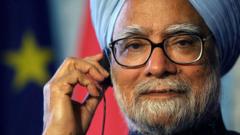**A deep dive into the life of Manmohan Singh reveals how his character and apolitical demeanor shaped a nation and its history.**
**In Memoriam: The Quiet Strength of Manmohan Singh, India’s Gentle Politician**

**In Memoriam: The Quiet Strength of Manmohan Singh, India’s Gentle Politician**
**Reflecting on the profound legacy of India’s former prime minister who balanced humility with bold policy decisions.**
Manmohan Singh, the former Prime Minister of India, passed away last Thursday, leaving a void in the country’s political landscape. In a world often dominated by aggressive politicians, Singh was renowned for his soft-spoken manner and resolute leadership style. A state funeral is set for Saturday, with the Indian government observing a seven-day mourning period in remembrance of a leader whose moderate approach left a lasting impact.
Singh, who served as the country’s first Sikh prime minister, was a prominent figure in Indian politics, notable for his prior roles as the governor of the Reserve Bank of India and the finance minister before his two terms as prime minister from 2004 to 2014. Despite steering India through a crucial economic transformation, his demeanor was markedly different from the more flamboyant leaders of his time. Friends and critics alike commented on Singh's aversion to drama, his tendency to embrace a more measured response even in times of scandal, and a commitment to avoid unnecessary conflicts.
His supporters praised him for his pragmatic approach to governance, emphasizing results over rhetoric, a philosophy that enabled him to implement pivotal market reforms that liberalized India's economy during his tenure as finance minister. Notably, his policies were credited with sparking economic growth and fortifying India's position on the global stage. Even his political adversaries acknowledged his honesty, though they often criticized him for the perceived lack of assertiveness required for leadership.
Singh’s humble beginnings, growing up in poverty in what is now Pakistan, crafted a narrative of resilience that resonated with many, particularly the middle class. His groundbreaking apology in parliament for the horrific 1984 anti-Sikh riots showcased a boldness that transcended party lines, earning him respect across the political spectrum.
He was instrumental in significant diplomatic endeavors, including a landmark nuclear deal with the United States in 2008. Although controversial and met with fierce opposition, Singh’s adept handling of international affairs during tumultuous times strengthened India's global standing.
Yet, his later years as prime minister were marred by a series of corruption scandals that engulfed his administration. The fallout from these allegations led to a dramatic shift in public perception, culminating in his decision not to seek a third term in 2014. Singh’s final press conference saw him defend his legacy, asserting that history would view him more kindly than contemporaneous criticism suggested.
While his refusal to engage publicly on numerous pressing issues—like the 2012 Delhi gang rape that ignited nationwide protests—coupled with economic stagnation led to criticisms of complacency, Singh maintained his dignified demeanor despite mounting public anger.
Ultimately, despite facing a barrage of challenges, Manmohan Singh’s legacy as a compassionate leader characterized by integrity remains intact. His commitment to policies aimed at uplifting the marginalized and striving for tranquility in geopolitical relations undoubtedly shaped the India of today, marking a significant chapter in its journey towards progress and stability.



















